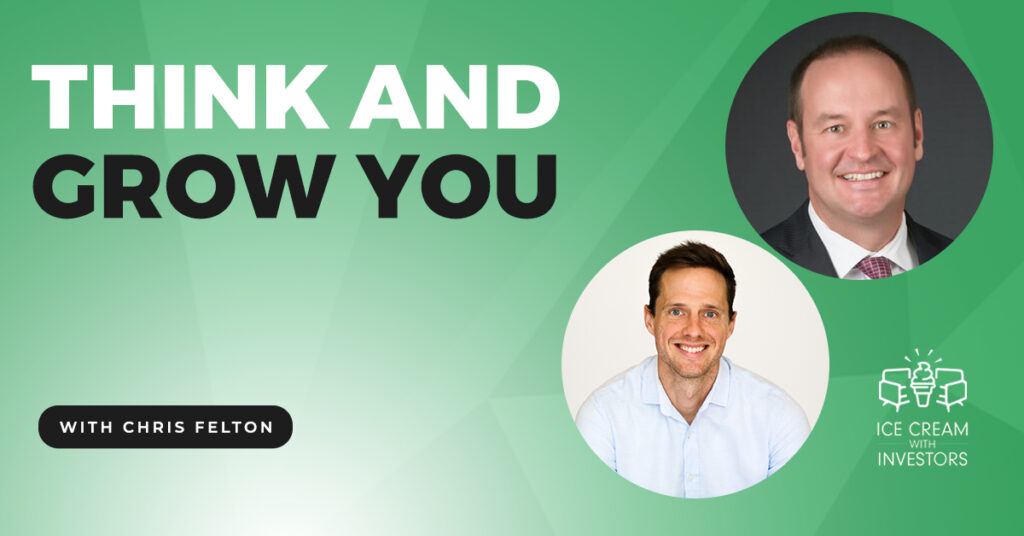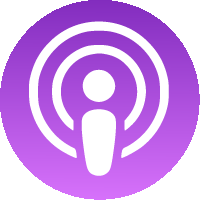Chris Felton, our beloved best-selling author and 7-figure entrepreneur, is back for more! In this episode, Chris discusses the launch of his new book, Think And Grow You. If you’re stuck in a life of fear and doubt, this episode and book will show you how to break free. It’s time for you to think and grow YOU! You’ll never be “ready enough” to take control of your life and reach your full potential. We all have the ability to create change in our lives. But it’s not easy, and it doesn’t happen overnight – but listening to this episode and reading Chris Felton’s book is definitely a great start! You know what matters most to you, and it’s long time for YOU to make that happen. Tune in now!
—
Watch the episode here
Listen to the podcast here
Think And Grow You With Chris Felton
Chris, welcome back to the show.
It’s great to be back. Thanks for having me.
We’re going to treat this interview differently because we’ve already had you on the show and our readers can roll back and read to the first one we did. The reason why we had you as a first repeat guest is that you’re coming out with a new book called Think and Grow You. I was super interested when I was reading through the manuscript on having you back on and talking through some of those. Let’s start with why you decided to write the book, and we’ll jump into the questions I got.
The reason I wrote the book is that I invested six figures plus in personal growth and development. I’ve spent thousands of hours studying this topic of how we get stuck and how we get unstuck. My prayer was, “I’ll write it. People can get results in a shorter period with much less investment and have it make an impact for them.” That’s what I want to do. I want to make a big impact on as many people before I depart the planet, hopefully, several decades from now.
You mentioned spending over six figures on personal development. It’s a concept that might shock some people in terms of the number of dollar figures there, but overall, the best investment you can make is in yourself and I would beg to say that every dollar I’ve spent on personal development has not been wasted. Some have been more successful than others and they haven’t been wasted. I’m glad that you’re sharing the knowledge that you spent over a couple of decades here.
The returns are astronomical and it is the best investment you can make, no doubt.
Let’s start with this idea of being stuck. We’ve gone through a number of years here where it seems to be choppy, with ups and downs, and a lot of people are finding themselves in different roles, out of work, or in a different place in their life than they thought they would be. How do people get stuck? What are the keys to being stuck and how do we become unstuck?
I mentioned the book, Positive Intelligence in my book. Shirzad Chamine wrote that unbelievable book. He says, “Judgment is public enemy number one, judging ourselves, judging others.” The way we get stuck is it’s an outside-in approach to life. Something happens and we judge it. We call it bad or good. We label it and we go to, “This shouldn’t be happening.” We play the victim card, which people get offended when I use that word.
The victim is, “My outside world dictates my responses and I’m blaming the outside for my failure, lack, whatever.” Outside-in doesn’t work. If you’re constantly taking your cues and your outside world is dictating your thinking, then you’re going to be in this state of resistance and resistance is what shouldn’t be happening. We’re coming out of multiple years of a pandemic where it was, “This shouldn’t be happening.” I got impacted and there are nasty things that came out of that but our business grew and we had multiple record years on top of each other.
Not because we’re better, smarter, or whatever. It’s just me and a leader of a group of people who did it. It stunk. I didn’t like it, it came down, but the quicker I could get to this is what it is, the more I could create from that platform. The example I give always and in the book is, we get a flat tire and, “Where do we go? Why is this happening? This shouldn’t be happening. Who didn’t fix that pothole?”
We go in there and meanwhile the flat tire’s sitting there not caring. I always ask myself, “How long do I have to put myself through mental gymnastics to get to the point where I have a flat tire and just accept that I have a flat tire?” I had a great coach for many years. I referenced him in the book multiple times when he said, “You don’t need to love it, but you need to stop hating it.” That was our reaction to the pandemic from a business standpoint. We were able to pivot because we said, “This is what it is.”
I don’t like it, but I’m not going to hate it and I’m not going to sit here with my head in the sand going, “This shouldn’t be happening.” Once you get clearer, “I got a flat tire,” there are only two relevant questions. First is, “What do I want?” I want to be back on the road. “What’s the next thing I need to do?” Get the jack. The way you get out of stuck is you get out of resistance, you get out of, “This should not be happening,” and you accept that it is, it’s only from that platform of acceptance that you can start making new choices, which leads to new actions and different results.
Are you Stoic? Do you follow Stoicism at all or anything like that?
I don’t know what happened to my Ryan Holiday emails. I’m a big Ryan Holiday fan. I need to go back in there and see what happened. My son’s 21. He’s a total stud. He got me into his emails. I think the email I sent out had a Socrates quote in there.
The only reason I ask that is that in my part of my morning routine to listen to some affirmations while I go through some stretching, and those affirmations here for the past weeks have been more on the Stoicism mindset. If that’s a new word for a reader out there, a lot of stoicism is, essentially, you can’t change what happened in that situation. You can only change your reaction to it. From what I’m hearing, this is our resistance that comes from putting a label on something that happens rather than saying, “What do I want, and what’s the next step?”
There’s usually a blessing behind it. It’s a chapter in my book. It’s don’t label it good or bad. I talk about, what happened to me in my business that appeared from the surface, and my wife spent plenty of time telling me it was bad and I was broke and stuck because I constantly did that. It was shown to me growth and development and what I needed to do. I just told myself, “You need to do something different.” I got to acceptance in a bad business situation. I got to it quickly within hours and took action from a different platform. What came out of that was an incredible blessing to my family and the family came to us as a result of that, very powerful not to judge.

Think And Grow You: In order to achieve growth and development, you need to do something different.
In the book, you have five different pillars and then underneath each pillar, you have sub-pillars, up to 10 to 7 of each different pillar. I went and picked out a couple that I wanted to go over with you. The first pillar that you have is to Get Out of Your Way and one of your sub-pillars was Ego. Speaking of Ryan Holiday, he wrote the book, Ego Is the Enemy. I’m always interested in learning how our conscious but, more importantly, our subconscious ego gets in the way of us making good decisions. Talk to us about ego and how it gets in our way.
I love Ego Is the Enemy. That’s a phenomenal book. That book was given to me by a leader when I was trapped in that. People say, “Your ego’s good. Ego’s bad.” Once again, labeling, ego, you do need it. It’s I’m in Colorado driving down I-25. It’s good that my ego’s aware that when the semi is coming over into my lane, it’s going to wake me up. Ego is out chasing the sabretooth tigers and survival. It’s there to keep you comfortable, stuck, and exactly where you are.
One of my favorite quotes which I start the book with is from Jeff Shore, “A life spent seeking comfort results in an entirely uncomfortable existence.” We saw it during the pandemic. The people that got hurt the worse were addicted to being comfortable. The ego wants you to stay in that and the problem is you get used to dysfunctionality. That’s where I was, Great Recession of 2000, for a big chunk of my life, I didn’t know it until I started working on myself. We were $250,000 in credit card debt. My wife’s stressed out, my business isn’t growing and I started getting used to losing.
A life spent seeking comfort results in an entirely uncomfortable existence.CLICK TO TWEET
I started getting comfortable with it and my ego was like, “It’s not your fault. It’s your ex-wife. It’s the economy. It’s your team. It can’t be you.” Finally, when my back was up against the wall, I had to wake up and I had to realize that I created the whole problem, and part of the stuff that I talk about is I had to humble down, look at my actual results, and know that ego was not my amigo.
When I connected the price that my family was paying for me, staying comfortable, me paying attention to my ego, me staying in that world, it was devastating, and I was staring down divorce number two, not seeing my kids, bankruptcy, and getting rid of my business. I had to become aware of how I was getting in my way. One of them was quieting and not paying attention to my ego. It’s a forever project. I don’t have it all figured out but I’m a lot better than I was years ago.
“Ego is not my amigo,” might be the quote of 2023 that I’ve heard so far. It’d be a hard one to top.
I stole it. Somebody said it.
What I’m hearing from that conversation around being humble and not allowing your ego to get in the way is finding pockets of your life where you can go learn a new skill, be uncomfortable, or something like that. We started our family learning Spanish, and I know enough Spanish to sound impressive to somebody that doesn’t speak Spanish. What I’ve learned living in Florida is I don’t know Spanish at all. We’re trying to take that on as a task to go learn. That humbles you and helps you understand the things that you might be good at. Is that a good place to start as something that you don’t know and go learn that?
That helps. Doing new things is all important. It’s important to sit down. I made a post one morning on my weekly email called, “Thank God it’s Monday.” I call it the ultimate focusing question, and it is, “What am I thinking and what must this be creating?” In my book, I give numerous journaling exercises where it’s me plus thought equals a result. If I don’t like the result, there’s me and my thinking.

Think And Grow You: One of the first steps to getting unstuck is to do numerous journaling exercises where it’s: me plus a thought equals a result.
I was stuck with money. One of the things I had to do was sit down and here’s this word, money. What do I make up about the word? If you don’t like the results in your life, whether it’s money or health, relationships, or whatever, to change the results, you got to change your thinking. I had to go through a process of inventorying all my money head trash. Money’s hard to make, and money’s hard to keep.
When’s the shoe going to drop? Rich people are terrible. Rich people make money on the backs of poor people. When I inventoried all that, I’m broke because my stories are horrible. I’m stuck that is where my focus is. The work was, “What’s the empowering story I want to have?” I had to start creating a focus on that. Stuck is always created by a reaction to something you don’t like and it’s the repetition of the thought that keeps you stuck. New thinking, new results.
That’s one thing everybody can do from reading this episode go journal what your relationship is with money and what the words you associate with money are. What I’ve found is when I have that conversation with folks, it’s usually inherited knowledge that they’ve transferred over their childhood into their adulthood. Rich people are terrible. Somebody else has to do the money. I’m not good with money. Those things are ultimately your limiting beliefs.
By the time we’re 18, we’re 100% programmed in our lives. People are good, and people are bad. Money’s good or money’s bad, whatever it is. Studies have shown, the ultra-wealthy, had the same limiting beliefs handed to them. At some point in their lives, they sat down. For me, I was 37, and I was like, “What’s creating this? Why does this keep creating broke?” I should probably inventory it and begin to question it. It was unconscious crap I borrowed from my parents who borrowed from their parents. It’s generations of unchecked stories. I took a time out and questioned their validation of them, and did the work to change. Now my children have none of that.
Setting the future of generations ahead too.
They’re way better than me this time.
What we’re talking about is this concept that you’re calling the Shift. In the shift, I noticed you had this concept called the What If. Talk to us about the What If.
I realized that I created broke. I created the mess. I created the disaster. I got to acceptance, but I knew I had to change and that’s the theme of my book. I hope what flows all the way through there is, ” you need to humble down a bit. You got to be willing to change. You got to do the work, but you need to understand that it’s worth it to do the work.” That’s my message throughout the book. I use that with lots of stories. I need new answers because I hired a coach for years and he said, “Based on results, how’s your way working?” I freaking hated that question.
He was a mirror for me. I got to start thinking differently and doing differently. I hired another coach for a couple of sessions. He was a mindset guru, a good friend of mine. I paid him $375 I didn’t have. We do this 1.5 to 2-hour session. He’s like, “What’s the goal?” I’m like, “I need to double my income, or my wife’s leaving me because she doesn’t want to live with a broke dude anymore. She’s done.” We got to get rid of all this debt. The only way I can get back to financial breakeven is we got to double. It was a decent six-figure income before, but I’m like, “I got to double it.”
He would ask me questions, and then he would like to do this Yoda thing. He’d close his eyes and breathe deeply. I’m sitting there mad. I call myself a recovered CPA and what is this crap? I’m looking for a strategy. I’m looking for the how-tos. We’re programmed that way. Especially guys, “I got to fix this thing. I got to work harder. Do this.” We end the two hours already paid him. He is like, “What’s the amount you need to make again?” “It’s this amount.” He’s like, “What if you make that amount, hundreds if not thousands of times a day? Go around. What if I do this? What if I make this? What if I’m financially independent? What if my net worth is this?”
I was shocked. I’m like, “What? You’re a freaking fraud. I paid you $375 that I didn’t have and that’s what you came up with?” He’s like, “How’s your way working?” He’s like, “It’s simple. You probably won’t even do it because you’re looking for some complexity and that’s why you’re broke. I’m like, “I’m in. What else?” It was, “What if I cashflow this?” He explained it. Your subconscious mind can’t fight a what-if statement.
If I say, “I’m a billionaire, am I subconscious?” No, you’re not. If I say, “What if I am?” or whatever it is, it can. He’s like, “You say it over and over again. What happens is your subconscious is powerful, but ideas have to be consistently and repetitively handed over to it through statements with motion and feeling through images and visualization of a feeling. Eventually, that door will open and your subconscious will accept the idea as true and watch out.” I talk a lot about it in the book. Watch out. You’re aligned. It’s called an internal mastermind. Your conscious and your subconscious agree. He’s like, “Eventually, your subconscious will accept it and it will happen.” That’s what I did. I what-iffed all the time and I started there.

Think And Grow You: If you say to yourself, “What if I am?” over and over again, your subconscious will start to think that you are.
There’s a great story in the chapter called Be a Spark where I taught somebody the concept. His life was a mess and his wife was going to leave him. We were in a similar situation and he started what-iffing. He had five times his income and he saved his marriage. It’s crazy. I see him. He shares a story in the book. I saw him. He did some training for my guys and he’s like, “You save my life.” I saved his life with a what-if concept. It’s crazy.
I know that sounds fluffy for a retired CPA or I work with engineers who might be engineers in more analytical moments, but I do believe that the world is a mirror. What you’re seeing in the world is what your conscious and subconscious are stating to you and you find what you’re looking for. That’s what a lot of people miss in life. They don’t know what they’re looking for so the world dictates what they should be looking for. Whereas if what you’re looking for, you’re more likely to see that, such as the red jeep that you bought. Now everybody’s driving a red jeep.
Once again like these concepts, the stuff I teach in the book, it’s me throwing myself under the bus. The whole book of this is what I was taught and we were taught left-brain concepts, intellect wins the day, and the smartest guys win. It’s all this stuff that we were programmed with as kids. It worked in Corporate America for me. As I stepped out into the entrepreneurial world, it wasn’t working and my way wasn’t working. It’s not about my way versus your way or all that. I tell people, “If you like the results, keep on doing it. If you don’t, something has to change.”
I know tons of broke smart people. Smarts have nothing to do. I know a lot of broke CPAs. I know a lot of broke engineers. My 21-year-old is a software engineer, and I’m like, “The software has to get upgraded if it’s going to go to the next level.” This dude had to do a massive upgrade. Do you remember Compaq computers? Compaq was the deal. I was running around with a Compacq operating system and Windows 12 or the hardware or software wasn’t coinciding. I had to upgrade my thinking if I wanted to get a better life.
We’ve gone through Get Out of Your Way and Make This Shift. The next pillar that you had was about Relationships. I’m interested in what you think is the most important thing about managing relationships that people don’t do.
We’ve talked about it, where it’s like, “What am I focused on in that other individual?” Again, it’s easy. Our brain’s familiar with judging other people for what they’re not. It takes work to see people the way they want to be seen and that happens the more you improve the way you see yourself.
Our brains are familiar with judging other people for what they’re not. It takes work to see people the way they want to be seen. And that happens the more you improve the way you see yourself.CLICK TO TWEET
That’s important that you said it takes work to see people the way they want to be seen. Dive into that. What do you mean by that? How do we see people the way they want to be seen or understand the way they want to be seen?
There are a couple of things. One is understanding that judging others and judging ourselves is the number one way we stay stuck. Judgment is public enemy number one, as Shirzad Chamine said. As I was beginning to do the work, I’m going, “If I want to have a better life, it takes energy.” For me, it’s not time management. I’m a planner. It’s energy management.
I was watching all my energy leaks that were happening. I’m 51 now in 2023. My energy’s better at 51 than it was at 41. I’m in better shape. The mental resistance has been eliminated. Nothing sucks your energy more than judging others and judging yourself. My judgment project is infinite. I started becoming aware of when I judged. That person’s walking down the hall and I’m like, “They’re that. They’re this.” The chatter in your mind is insane.
One of my major goals is a forever game. It’s an infinite game from way better. I wanted a quiet mind. I wanted a peaceful mind. I had to start becoming aware of when I was judging others and breaking the pattern. Instead of seeing that person and going, “They’re this,” now, I mentally bless you. “Love to you.” You got a bunch of engineers like, “What is this guy talking about?”
When we arrived as perfect babies. We didn’t judge anything. We were perfect babies that deserve to be loved, have great lives, and be taken care of. Personal growth and development are about unlayering all the garbage that gets piled on. The other thing I recognize is that the things I don’t like in others are things I don’t like about myself. Projection became a tool for me to go, “Interesting. I don’t like that and that person. Let me journal on that. There’s something about me.”
Personal growth and development is about unlayering all the garbage that gets piled on and remembering we’re all babies that deserve to be loved.CLICK TO TWEET
It’s not trying to fix it. If you’ve got a bunch of left-brain people on here, it is the awareness of it. It doesn’t serve me. You don’t judge yourself for judging. Don’t beat yourself up. It’s curious. It’ll come up. I still do it way less than I used to, and I’m a Christian guy. I’ll cite Scripture to break the pattern. If you’re not, it’s some affirmation. I wanted to start breaking the judgment pattern because it was such a massive energy leak. The most important topic in that relationship pillar is forgiveness.
It’s one of the reasons why I wrote this book. I do a lot of keynote speaking and the commitment I’ve made for many years is I will always end with teaching that, but telling stories of how forgiveness transformed my life. When I come off the stage, I feel I delivered a lot of content. I feel I’d hit a home run. I feel good about myself, and my ego’s propping me up at an all-time high.
People will be lined up wanting to talk to me and all they want to talk about is the forgiveness piece. They are like, “You’re telling me that I have to forgive this person? Don’t you understand what they did to me? Don’t you understand how horrible they are?” It’s unbelievable. I got it because my coach said, “If you don’t do it, you’re going to be miserable SOB the rest of your life. Forgive your ex-wife.” That was the project he gave me. It transformed my world.
The idea of energy management sounds mentally taxing to me, and I wasn’t in your shoes of having to carry that resentment around. For most people out there that are reading this, I want to differentiate time management and energy management. I get energy from doing certain levels of activity whereas other activities are energy drainers.
To your point, I never even thought about the idea of judgment being an energy drainer. “I wish I could fix this. I wish they would’ve done this differently,” and things like that. To stop that, what you could do is have pattern recognition. If you see yourself doing this, insert another pattern. Yours was scripture. Somebody else’s could be transferring a rubber band from one arm to another or transferring a ring. It’s something to break the pattern so you don’t fall into that loop of judging.
It can be physical.
The fourth pillar is Developing a Game Plan. We’ve gotten out of our way. We’ve made the shift. We’re starting to manage our relationships better. Now we need to come up with a game plan. In this section, I highlighted the idea of something as a project. It’s not a problem. Talk to us about the difference between a project versus a problem.
I wrote the book and I want to emphasize that there’s somewhat of an order, but I had to write it in order. One of the mistakes people can make, especially if you’re into personal growth and development, is, “I’m going to do a bunch of work and fix themselves, then I’m going to execute my plan.” You’ll be waiting your whole life. I had to do it in the order I did because of the way the story plays out. It’s the awareness that you’re in your way and you must shift. Part of shifting is what I want and why and getting clear on that.
One of the mistakes people can make, especially if you’re into personal growth and development, is thinking that you’re going to do a bunch of work and fix yourself, then you’re going to execute your plan, and you’ll be waiting your whole life.CLICK TO TWEET
You’ve got to know where your point A is and where your point B is and all that. You got to pull up anchor and leave the dock whether you’re ready or not. A captain of a sailboat going to be like, “Here’s our A to B. We need to get focused on our first waypoint of many waypoints. There’s wind and we need to adjust the sails and all that.” Part of it is, you’re stuck. I was stuck. You needed a shift, but my back was so far against the wall that I had to take action whether I was ready or not. Clarity only comes from action. You got to leave the dock and adjust the sails. You couldn’t map it out. That’s important.
My coach said when we’re using money, “You don’t have a money problem. You have a money project.” That came out of Spiritual Economics, Eric Butterworth’s phenomenal book. We view problems as, “Only miracle that can save me.” We play the victim when we’re in problems, but projects are different. We’re going to do the work, and we’re going to face obstacles, but the problem might not ever get solved. The project will get finished. It’s a total mentality shift. We view problems and projects differently.
When you say you don’t have a money problem, you have a money project, that’s interesting. He’s like, “You got to work on your program and you got to do some how-tos. Get the budgeting and make some small changes and do that. You stay on the project. Communicate with your wife and all these things that we had to do, but eventually, you’ll finish the project. It once again gave me different energy and energy’s everything. It transformed my world.
The vocabulary you use matters. Projects and problems can shift our vocabulary a bit. Something is not happening to me, it’s happening for me, or different ways that we can change the vocabulary that we use to talk to ourselves to get us going in a better direction.
That’s part of the book too. I had to get mindful of, “What do I say when I talk to myself?” It’s called metacognition. It’s the capacity to think about what I think about. I had to become aware of what I was thinking about. Once again, what am thinking about? What must this be creating? When you verbalize something, it’s like 45 to 50 times more powerful than a thought. I limited the words but, try, and can’t out of my vocabulary. The new newsletter I put out once a week is called Thank God it’s Monday. I started Mondays by going, “Mondays are terrible. I hate Mondays.” I communicated that. I found what I was looking for.
You changed it to Monday as an opportunity.
Mondays are always awesome and we’re doing this on a Monday. I’ve had a rock in Monday so far and Mondays have always been awesome for the decade-plus since I’ve been telling myself that. What you verbalize is infinitely powerful so you got to be mindful.
The last pillar you talk about is this idea of the dream and knowing what you want. I feel we were saving the gold for the last one here because knowing what you want is the hardest part, and having clarity on what you want is the hardest part of any journey. How do you help people understand and know what they want?
I’ve been blessed to have world-class mentoring, and unbelievable people in my life. I’d sit through training, and all the top players would say the same thing. You got to know what you want. You got to know your why. It’s one of the most beat-up topics in personal growth and development. I did what most people do. I would write down, “I got to know what I want. I got to get to that.” I write notes and I’d close my notebook and go back out into a crazy busy world and get too busy.
I’d sit back in a training and I’d get the say, “You got to note this. Note to myself.” I was fortunate to be in training in New York with the top leaders of our company. We were talking about our business systems, the business how-tos, and all these things. One of the main speakers showed up late. He walks in and I look in the back of the room and he’s shaking his head. His arms are crossed. We’re talking about sausage making. We’re talking about the how-tos of it all. He stepped up and interrupted the meeting.
He’s like, “What are you talking about? Why are you wasting time talking about this?” He’s speaking to 50 of us. “Your challenge is you don’t know what you want and you don’t know why you want it. Since I’ve been here in this company, I’ve always known it. I’ve always known why. I could articulate it in under 45 seconds with absolute conviction that’s going to happen. That’s why I’m crushing you.”
He is. I’m in an entrepreneurial business. He’s killing it. My wife was with me. I’m like, “Done.” We went up to our hotel room and we scheduled the time and I’m like, “We are not leaving until we’re clear on what we want.” We spent an hour going, “Why?” We set a financial goal and I said, “Why does that matter?” It all came back to everything we do in life, we want to obtain a feeling. We wanted financial relief. That is what we wanted, like oxygen. It took an hour or so, to realize that and we got clear. Now, we had the goal, which was the Ferrari of a certain net worth that we wanted to hit, but the gas for the Ferrari was the reasons.
I don’t want to fight with my wife ever, getting around money. I want to see my kids who live in Atlanta. I’m in Colorado. I want to see them whenever I want. I want to teach this stuff. I want to impact people. It’s always tied back to people. It’s never stuff. We had a material goal we were going for. The reason and the people going to get blessed in the process is the juice, which is why I wrote the book and have lost zero enthusiasm for this project over the last several months.

Think And Grow You: The goal is always tied back to people. It’s never stuff, but we can have a material goal we’re going for. But it was the reasons and the people are going to get blessed in the process is the juice.
What I’m hearing is knowing what you want and keep asking yourself why until you get to the answer.
Most often, people don’t want to step up because they want to stay in comfort. They don’t want to say what they want because they don’t want to be held accountable for it. It’s a cop-out. I don’t know why. No BS. “You know why.” “I don’t know why.” Write down everything that you don’t want. That’s where you focus. That’s where I tell people, I’m like, “You know plenty what you don’t want. Let’s write down that list.” They write it down. I don’t want to be broke. I don’t want to do this. I don’t want to do that.
Let’s write the opposite that’s more empowering. Let’s get clear and get your reasons. “I don’t know what I want. I don’t know why.” Total freaking cop-out. You must spend the time to do the hardest work on the planet, which is thinking. Pad of paper, pen, and your ego will jack with you for 10 or 15 minutes. Once it starts flowing, you know it. You start entering that subconscious. That’s a reservoir of gold. Amazing things can come out when you schedule the time to think.
You’re most deadly when you sit in a room uninterrupted with a pen and paper. That’s when you’ll find out what you want and why you want it. Chris, I always love having you on the show. You’re our first repeat guest because you bring so much value and you help me think about my subconscious. As we’re having these conversations, I’ve taken a bunch of notes on some things that I want to go ask myself. If our readers wanted to reach out to you, learn more about you, or get a copy of Think and Grow You, where’s the best place we could point them?
My website ChrisFelton.me is where you’ll find the book on pre-sales starting February 1st, 2023. We got a pre-sale period that’s about 6 or 7 weeks long, and with that, they get a bunch of cool bonuses. They’ll get the PDF version of the book as well as some other cool things, cool gifts, and bundled packages of bonuses there.
It’ll get on my weekly distribution list of value. I’m throwing out stuff that helps me already got the next 30 concepts written out. I’m super excited to share that. That’s different stuff that’s not necessarily in the book. My launch is March 25th, 2023 and that’s when the books will be ready to roll. If you’re in Denver, Colorado, all my launch is from 12:00 noon to 4:00 on March 25th in the Denver Tech Center area. You’ll get the details from my email. That’s how you track it down.
Thank God it’s Monday and thank you for coming on the show, Chris.
Thanks for having me.
Important Links
- Chris Felton – LinkedIn
- first – past episode with Chris Felton
- ChrisFelton.me
- Positive Intelligence – Amazon
- Ego is Your Enemy – Amazon
- Spiritual Economics – Amazon
About Chris Felton

As an international speaker and bestselling author, Chris is committed to sharing his story and lessons learned from being on the brink of financial ruin and divorce to building one of the most successful financial services firms in the country. He speaks on stages to audiences of over 20,000 and appears on top podcasts, such as the Ed Mylett show, reaching millions of listeners around the world.
While he’s achieved a lot of business success, life is about more than money for Chris. He supports causes focused on eradicating poverty, animal rescue shelters, and his company’s foundation that focuses on supporting local charities for its agents.
With his latest book and speaking series “Think and Grow You”, Chris is focused on helping driven entrepreneurs break through plateaus in their growth by learning how to get out of their own way and take their success, peace, and impact to the next level.





